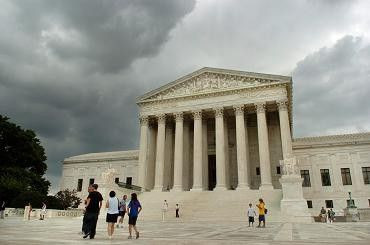Occupy the Courts: Activists to Protest Corporate Personhood at Nationwide Events

Occupy protesters across more than 100 U.S. cities plan to demonstrate in front of Federal courthouses on Friday, Jan. 20, to lead a charge against an opinion that was institutionalized by the judiciary: the idea that corporations have constitutionally-protected rights.
However, protesters in New York City, the birthplace of the Occupy Wall Street movement -- which arguably launched the recent national conversation on corporate personhood -- will likely meet up at their old stomping ground at Zuccotti Park after being denied the right to rally in front of a courthouse in Lower Manhattan.
Organized by Move to Amend, a coalition supported by hundreds of grassroots organizations, the protests have one main goal: to build public support for a constitutional amendment that clearly and unequivocally states that rights recognized under the U.S. Constitution -- in particular, freedom of speech -- only apply to human beings.
Our goal is to abolish all corporate civil rights and eliminate the legal doctrine that says money equals speech, David Cobb, a spokesman for Move to Amend.
On Friday, protesters in at least 110 U.S. cities will group in front of Federal courthouses, including the U.S. Supreme Court, symbolically occupying the buildings to protest the concept of corporate personhood. The demonstrations, organized by local groups, will vary by location -- for instance, Occupy the Supreme Court reports its event in front of the nation's highest court will include protesters dressed as Supreme Court Justices and dances by The Supremes, alongside a giant replica of Move to Amend's desired 28th Amendment.
The Supreme Court's 2010 decision in Citizens United v. the Federal Election Commission introduced corporate personhood into U.S. law. In it, the court ruled that the First Amendment prohibits the government from placing spending limits on for political purposes on corporations, since political spending is a form of speech.
Wants Citizen United Decision Reversed
Occupy Wall Street protesters have been calling for the reversal of the Citizens United decision since they pitched their tents in New York City's financial district four months ago. However, so far the New York City event scheduled for Friday is the only one out of the hundreds planned across the country that may not be able to occur. This week, the Government Services Administration denied a permit request filed by members of the OWS Subgroup to End Corporate Personhood, claiming it interfered with events scheduled at the lower Manhattan courthouse in question that day.
Media mogul Russell Simmons, the anti-corporate performance artist Reverend Billy, and author Christopher Hedges are all scheduled to speak at the New York City event. Although the city's permit denial was appealed, Cobb said there is no way to know if it will be overturned by Friday.
The protests will be used to publicize the Move the Amend coalition's campaign for the creation of a 28th constitutional amendment that would go beyond reversing the Citizens United decision. The amendment would clearly state that only human beings are protected by rights recognized under the Constitution, and also establish once and for all that political campaign spending by both non-profit and for-profit companies is not a form of speech protected under the First Amendment.
Corporations do not have unalienable rights, as guaranteed to us by the Constitution, Cobb said. This issue cuts across every single aspect of our politics, our community and our culture
Move to Amend is working to gain support for a federal constitutional amendment at the local and state level. So far, voters in Madison, Wisc., Dane County, Wisc., Boulder, Colo. and Missoula, Mo. voted in favor of ballot initiatives that support the addition of such an amendment. Cobb said the organization hopes to have 50 ballot initiatives by the November presidential election.
Since September, there have been five different constitutional amendments introduced in the U.S. Congress that would reverse portions of the Citizens United decision. Cobb said Move to Amend does not support any of the proposals on record because none of them clearly state that corporations have no constitutional rights, as well as specifically note that money is not a form of First Amendment-protected speech.
The OCCUPIED Amendment, proposed by Rep. Ted Deutch, D-Fla., is the closest proposal to meet those demands. The legislation -- a replica of which was introduced in the Senate by Sen. Bernie Sanders, I-Vt. -- would clarify that corporations are not living people protected by the Constitution and would ban corporations from using money to influence local, state and federal elections.
--
© Copyright IBTimes 2024. All rights reserved.





















